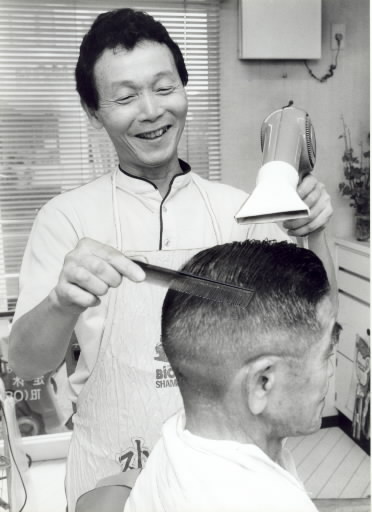The "Moral Adoption" of Hiroshima’s A-bomb Orphans, Part II [6]
Feb. 1, 2009
Moral parent's encouragement helps child overcome hardship
by Akira Tashiro and Masami Nishimoto, Special Reporters
This series of articles continues the story of the "moral adoption" of children in Hiroshima by American citizens. It was originally published in July 1988. The exact spelling of some names could not be confirmed.
"Many congratulations on completing your apprenticeship as a barber and finding a new job! It's challenging to face a new environment, isn't it?" [May 24, 1959]
Grace Mesab, a moral parent living in the U.S. state of New Hampshire, sent this note of encouragement to Osamu Muraoka, her adopted child in Hiroshima, who had reached adulthood. Mr. Muraoka, who was 22 years old then, is now 51. He runs his own barbershop out of his residence in Minami Ward, Hiroshima and leads a peaceful life with his wife and three daughters.
"I have a humble life, but Ms. Mesab made me who I am today," said Mr. Muraoka. "Back then, it was all so precarious, getting a job, quitting it soon after, hunting for another job."
With Mr. Muraoka often changing jobs, Ms. Mesab, who was single and a music teacher, worried about her adopted child. She sent letters to him about once a month through the Hiroshima Peace Center, though he rarely wrote back.
"I understand that you had no choice but to change jobs, working long hours for low pay. Please tell me frankly what kind of work you're doing now. Please be careful to keep your spirits up, even in hard times." [October 25, 1960]
Her letters of encouragement gradually moved the heart of the young man. He wondered if there had ever been anyone in his life who showed him such concern. At the age of three he was separated from his mother and had lost contact with her since then. After experiencing the atomic bombing when he was eight, he ran away from home and from his father. In the fall of 1945, he entered Ninoshima Gakuen, a child care facility on Ninoshima Island just south of Hiroshima. At 18, he became alone again after leaving the children's home. There were times, after this, when he nearly gave in to despair. But the letters arriving regularly from Ms. Mesab helped him to keep treading water.
In 1963, Mr. Muraoka decided to make a fresh start by becoming a barber and landed a job at a barbershop in downtown Hiroshima. He met Mariko, now 44, who worked nearby and the couple was married two years later. In the fall of that year, he opened his own barbershop at its current location.
Ms. Mesab was thrilled to receive the news that Mr. Muraoka had gotten married and opened a barbershop. In 1973, she came to Hiroshima, having told him: "I want to see you and your family, even if it's only once." Twenty-three years had passed since she first became Mr. Muraoka's moral parent when he was just 13. Mr. Muraoka recalled the day he saw his moral mother for the first time, remarking, "I still remember the touch of her large, warm hands."
After returning to the United States, Ms. Mesab wrote to Mr. Muraoka and thanked him for his hospitality: "I feel like I've finally done something that I was destined to do." Looking back on his connection with his moral mother over many years, Mr. Muraoka realized that the one-time meeting with his moral mother was the highlight of his life.
In her later years, Ms. Mesab was troubled by angina, a chronic disease she had long suffered, and her letters to Mr. Muraoka came less frequently. Around that time, Megumi Muraoka, 21, Mr. Muraoka's oldest daughter, who had studied English in junior high and high school, began to help her father by translating his words into English. So, with his daughter now serving as his "interpreter," Mr. Muraoka, now in turn, wrote to his moral mother to keep her spirits up.
"Dear Megumi, Your English is very good. You write about your family very well. I'm happy to have three such wonderful grandchildren in Japan." [January 11, 1983]
Three years ago, in the spring of 1985, Megumi realized her long-awaited dream of attending university. At that point, the "language barrier" with Ms. Mesab almost disappeared. But the words "I'm not in the best of health" appeared more often in her letters. Then, in 1986, the news of her death arrived.
"I was prepared for the news, but I was still unable to concentrate on my work for a while," Mr. Muraoka said, turning his eyes to a photograph of his moral mother. "Her letters of encouragement made me who I am today. In retrospect, it was the most important period of my life."
(Originally published on July 29, 1988)








